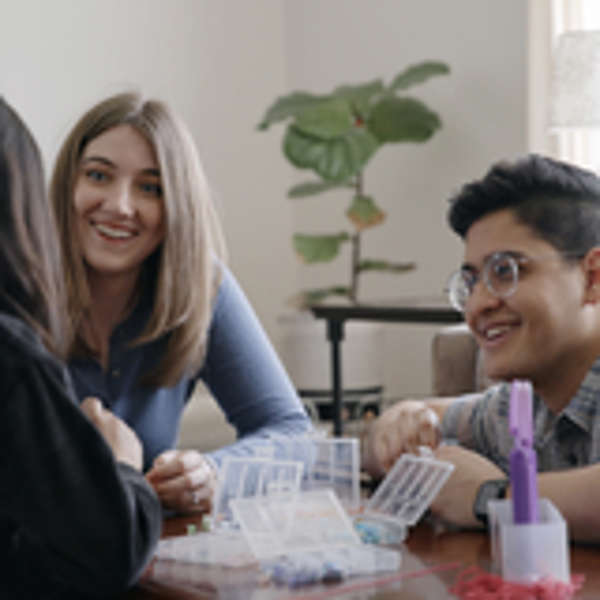When kids aren’t ready to receive your love
Love is complicated for children with a trauma history
Mandy Taylor, MSW, Parent Support Supervisor

If you’re considering adopting from foster care or becoming a foster parent because you’re hoping to “love on” a hurting child, there’s an important truth you need to know before you jump in: that child may not be ready to receive the love you’re hoping to share.
I understand the intention, particularly for Christian families thinking about fostering a child; but children with a trauma history often have a complicated understanding of the concept of love.
We use the word “love” so casually and in so many contexts: I love pizza. I love that shirt. Do children know what relational love means?
Kids who enter foster care have grown up in hard homes with parents who are stretched. And parents who have experienced abuse or who never heard their own parent say, “I love you” often struggle to say those words or show love to their children. So when those children hear, “I love you” from an adult who hurts them, they internalize conflicting messages about love. And kids who never hear, “I love you” have no foundation for what that word means.
Many children who enter foster care have internalized a painfully negative message: I’m not worthy of love. So while you may be drawn to fostering to love a child, please realize some kids aren’t ready to be loved—not by a stranger.
We show love through our actions, such as giving a child attention. When parents neglect their kids, children internalize the message that something is wrong or bad about them. Sometimes kids perceive this message, and sometimes parents actually say it. It only needs to be said once for a child to believe it.
Can you see how it would be hard for a child to respond when a cheery foster parent says, “I love you”? Can you see how it can be equally confusing to hear “Jesus loves you”?
Remember what's happening in the child’s world: They don’t see Mom and Dad every day, and they wonder, Do Mom and Dad still care? The only parents they’ve known may have instilled in them a belief system with indelible messages such as:
- Adults aren’t trustworthy.
- Adults lie.
- Adults might hurt me or each other.
- Adults solve problems with violence.
- Adults don’t care about me.
Further, children often believe what has happened to them is their fault. Kids from hard places carry an “invisible suitcase” filled with beliefs about themselves and the world. It’s their “baggage,” so to speak, and they unconsciously try to get others to buy into what they believe. One of the easiest ways they communicate the messages they believe is in their behavior.
When I was a foster parent, I’d been through training, and I knew to carefully choose my words when dealing with difficult moments and behaviors. We had a child in our care who regularly heard “you’re bad” when she was young. In a conversation with her, I referred to a bad choice she’d made.
But that’s not what she heard. She threw up her hands and said, “Just say it! I’m bad. I know I’m bad.”
That was hard for me to hear, but that’s the narrative she'd internalized and believed for a long time. Today, she’s a permanent part of our family through adoption, and we are still working to “repack her suitcase” with positive messages.
Foster parents and parents that reunify with their children after foster care need to help change the child’s narrative from I’m bad; I don’t deserve to be loved to I’m good; I am worthy of love. This involves demonstrating that the child is worth your time and attention and also saying the words, “You are good.”
How can a foster parent know what wounds are inside a child’s “invisible suitcase”?
A child’s behavior is the clearest sign. Younger children don’t have the vocabulary to express their hard feelings, so they act out. They might be screaming because they lack the words to say, "My mom missed this week’s visit, and I’m afraid of what’s going to happen." They are not screaming just to scream or because they are a “bad kid.”
What about teens who might be better at hiding what they’re really feeling?
Teens are more aware of their emotions and can often put words to them, but it’s usually harder to get them to talk about their feelings. It’s helpful to talk in a non-confrontational setting. A car ride is a good option. Teens are usually more comfortable to talk when you’re not looking directly at them. If you have some music playing in the background, it removes pressure for both of you to fill the silence.
Important conversations often begin with a casual topic. I’ve noticed that my older children will initiate a conversation with me when I’m in the kitchen doing dishes. They’ll sit on the bench behind me and throw out little conversational bites to see how I’ll respond. When they sense, OK, she heard me and didn’t shut me down, they’ll gradually trust me with more.
How can foster parents and reunified parents help a child “repack their suitcase” so they can believe a different, more positive narrative?
Set up situations where you can catch the child doing good and say, “That was good! You made a good choice. You did a good job.” Help other people in the child’s life buy into the new narrative and reinforce it.
Should foster parents show love through hugs or physical touch?
Be very careful about physical touch. You know you’re a safe person, but to the child who just arrived in your home, you are a stranger. Be aware that some children don’t associate hugs with love. I still ask for a hug from a child who has been with our family for nine years. Because of her trauma history, I ask permission to be in her space. The child’s caseworker will know the child’s history and can guide you in this area.
Should a foster parent say the words “I love you” before they mean it?
Sometimes a child will say, “I love you” to a foster parent the first night they’re in the home. Foster parents ask me, “What was I supposed to say? I wasn’t ready to say, ‘I love you’ to them.”
I tell foster parents to build trust with their actions as well as their words. Show children that you mean what you say, and you don’t say things you don’t mean. You can respond with reassuring words such as, “I love that you’re here, and I’m excited to get you know you.”
What do you say to a prospective foster parent who “just wants to love kids”?
Don’t stop loving kids, but realize they may have a hard time internalizing the message you’re trying to send. There’s nothing more fulfilling than having your love reciprocated and getting tangible evidence that your sacrifice is making a difference. Foster parents need to be prepared that this can take a long time, and there’s no guarantee it will happen at all.
As you create a safe, stable, and loving environment for a child, be purposeful in your actions. They do speak louder than words.



